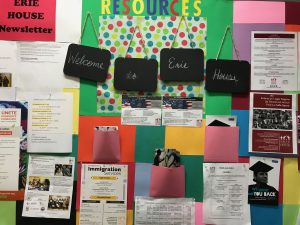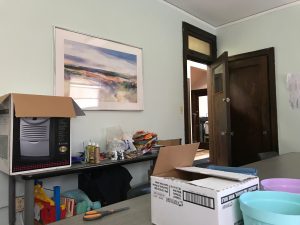As a recent graduate from Valparaiso University in Social Work and Spanish, I have begun to experience life in the “real world”. From various job applications to calling insurance companies, I am learning what it means to be an “adult”.
In this time of transition between my next job and the end of my college career, CAPS is filling the time with experiences that have opened my eyes to understanding the complexities of being a part of a non-profit organization. While this is not the first non-profit organization I’ve worked for, I have had the ability to see more of the “behind-the-scenes” aspects, such as the logistical planning and important meetings, such as meetings for fundraisers. In addition to these invaluable experiences, I’ve also come to discuss and explore what my calling is in this work that I do, but also understanding one essential aspect of service work: I am not a savior.
That probably goes without saying, but sometimes embedded subconsciously in our minds and hearts is the feeling that we are “saving” a community through the work we do. But we need to rephrase and review how we approach the service sector. The point of service and outreach is not to fulfill and feed the “savior complex” many individuals have, but rather to ask and assess what the community needs. We are more prone to assume what a community needs instead of taking the time to investigate what the community needs most, whether this is through forums, community surveying, or even personal testimonies from those living there. I admit that I had a “savior complex” stepping into the field of social work. I saw myself as someone saving other people, when in reality, it isn’t about me. It’s about the community or the client. Instead of saving, perhaps we should seek to empower.
There’s a famous metaphor that alludes to this concept of empowerment through the idea of teaching an individual to fish versus giving fish to an individual. Teaching the individual how to fish allows one to continue being self-sufficient. Other times, the individual knows the skills, such as “how to fish”, but doesn’t have the resources. And yet other times, they don’t have a place where opportunities or “fish” are readily available. Thus, non-profit work and service work should ultimately be about giving clients the tools to be self-sufficient and assessing the needs of the clients instead of assuming or giving without empowering them. Many of the programs here at Erie House support this idea of empowerment and independence. Through the citizenship classes offered to youth mentoring programs, the philosophy is that we are helping a community help itself. We are helping individuals help themselves. We are empowering, not saving.
Therefore, through my service work at Erie House, I am learning to be an accountable, active member in society. I am learning to give the tools, link clients with the necessary resources, and ultimately act as a way of getting clients to their goal—I am not delivering their goals to them. In all, I am just an everyday person looking to give back to a community with the hope that the cycle of giving and empowering allows the community to thrive in new and bigger ways.
Even though the work I do isn’t always glamorous or “fun”, I know that in the long-run, I am serving an organization that is here for the right purposes and serving the community in the best ways it can through the programs and resources offered. So as I sit here and continue to sort crayons and crafting materials, I know that these seemingly trivial tasks are important to the community and to the organization as a whole.

